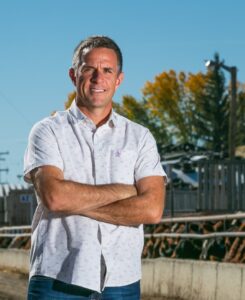Announcing the Beef Researcher Mentorship Program Participants 2021-2022 *New Video*
Remarque : cette page web n’est actuellement disponible qu’en anglais.
Researchers are critical for our industry. Engaging researchers who study cattle, beef, genetics, feed or forage production with the Canadian beef cattle industry is mutually beneficial; it allows researchers to be better informed of what the industry needs are and more likely to share their findings with a practical, solution-based focus. The BCRC Beef Researcher Mentorship Program provides opportunity for new researchers to be paired with two mentors that are relevant to their career as well as a travel budget to attend industry events.
A new video has been released which provides more information about the researcher mentorship program. As past program mentee Robert Gruninger, a research scientist at Agriculture and Agri-Food Canada’s Lethbridge Research and Development Centre, said, “For me, the knowledge that I gained from the mentorship program has been invaluable not only for me being able to get the job that I’m in, but also to be successful in securing funding that has relevance to producers.”
Watch the new video:
The Beef Cattle Research Council (BCRC) is pleased to announce the participants in the 2021-22 Beef Researcher Mentorship program. Following an open application process, four researchers from across Canada have been selected. Each has been paired with notable leaders in the Canadian beef industry and given a travel budget for the next year, which will provide valuable opportunities for greater engagement with Canada’s beef industry.
Mentee: Dr. Gleise Medeiros da Silva
Mentors: Fred Lozeman and Darren Bevans
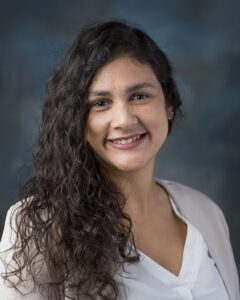
Dr. Gleise Medeiros da Silva recently joined the faculty in the Department of Agricultural, Food & Nutritional Science at the University of Alberta as an assistant professor and BCRC Hays Chair in Beef Production Systems. She obtained her Master of Science and Ph.D. degrees at the University of Florida, where she conducted several trials related to beef cattle nutrition and management. Her research focused on management of recently weaned beef calves, evaluation of feed additives, mitigation of environmental stress and nutrition of the pregnant cow. As the BCRC Hays Chair in Beef Production Systems at the University of Alberta, she will continue conducting research to identify sustainable nutritional/management strategies through applied research to improve health, performance and, therefore, profitability in forage-based beef cattle production systems.
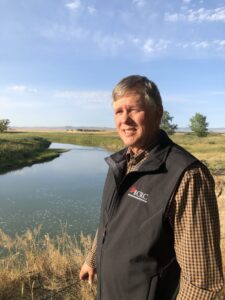
Fred Lozeman helps to operate a mixed farm near Claresholm, Alberta. The operation includes a small feedlot and two different cow-calf herds over different landscapes, from native rangeland to intensive, irrigated land. The farm also includes a variety of cereal, oilseed and forage crops, most of which are used for the cattle on the farm. The varied farming and ranching activities happen with the help of family, dedicated team members, friends and colleagues. Fred has been involved with Alberta Beef Producers as a director and as a Beef Cattle Research Council member for the past several years. He also was recently elected as a director for Results Driven Agriculture Research, an Alberta corporation that awards research and extension funding to benefit the agriculture and agri-food industry. Prior to his farming career, Fred trained and worked as a biomedical research scientist, including time at the University of Alberta, University of Oxford and University of Washington.
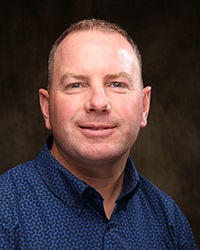
Darren Bevans is General Manager of Deseret Ranches, a large cow calf operation located near Raymond, Alberta. Deseret Ranches has vertically integrated ranches in Canada and the U.S., a feed yard, and two centres where top genetics are developed, with bulls used on commercial cows. Darren is currently on the board of directors of the Alberta Beef Producers.
Mentee: Dr. Hari Prasad Poudel
Mentors: Doug Wray and Graeme Finn
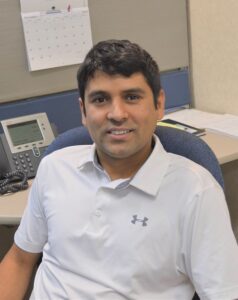
Dr. Hari Prasad Poudel recently joined Agriculture and Agri-Food Canada’s Lethbridge Research and Development Centre as a forage breeding research scientist. His long-rooted interest to study plant breeding and genetics was achieved when he received his Ph.D. in Plant Breeding and Plant Genetics from the University of Wisconsin-Madison in 2019. During his doctorate, Dr. Poudel studied phenotypic and genome-based selection approaches to improve the winter survival of lowland switchgrass. He developed molecular tools and resources that can be used to enhance winter survival without dependence on weather conditions. Dr. Poudel’s research interests include improving forage crops using phenotype-based selection methods as well as through genomics-assisted breeding methods and comparing their relative efficiencies.
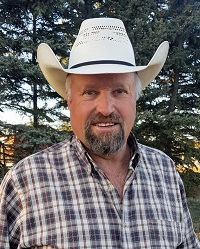
Doug Wray and his wife Linda own and operate the 110-year-old Wray Ranch along with nephew Tim and his wife Joanne. For the last 20+ years, adaptive multi-paddock grazing has been practiced on tame pastures divided into more than 60 paddocks. The Wrays graze year round, utilizing native pastures early in the winter and swath grazing midwinter to grass in early May. They run both cow-calf and grass yearlings to best capture the value from their forage. Weaned calves are backgrounded on multispecies swath grazing over winter. The Wrays are recently focused on regenerative practices to improve soil health and sequester more carbon. They are cooperating on research to measure and quantify carbon at whole-ranch scale. The Wrays continually investigate new technology and adopt when they see an advantage.
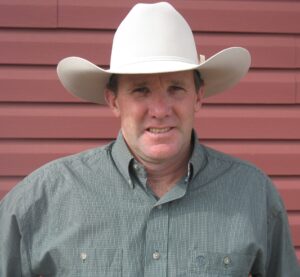
Graeme Finn and his wife, Heather, and their two young daughters, Claire and Morgan operate southern cross livestock a beef operation near Madden, Alberta. They manage a cow calf operation with a focus on year-round grazing both high legume pastures and annual cover crop grazing. They have been successful in incorporating intensive rotational grazing and winter grazing strategies into their management system. Graeme is in his 25th year of living in Canada and has been involved with some of his mentors for most of that time, mentors like Doug Wray, Grant Lastiwka and members of FFGA. His passion for looking at new ways to do things and finding ways to be profitable both by cutting the bottom line as well as looking outside the box to improve profit margin and run a beyond sustainable cattle grazing operation has made him keen in industry associations and getting more people involved in them.
Mentee: Dr. Maria Ceballos Betancourt
Mentors: Joyce Van Donkersgoed, DVM and Jake Bueckert
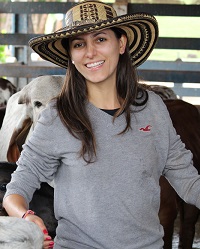
Dr. Maria Ceballos Betancourt is an assistant professor in beef cattle welfare and behavior at the W.A. Ranches at the University of Calgary, Faculty of Veterinary Medicine. She completed her undergraduate degree in animal science, at the National University of Colombia. She completed her master’s degree at the São Paulo State University (UNESP) in Brazil, addressing the effects of handling frequency of cattle kept under rotational and alternative grazing systems, with a focus on how cattle handling impacted their temperament. She completed her Ph.D. at UNESP, focused on human-cattle relationships and its effects on cattle welfare, as reflected in temperament, behavior, physiology and performance measures. By the end of her Ph.D. program, Maria Camila secured an internship at the Animal Welfare Science Centre at the University of Melbourne – Australia, where she participated in a project focused on the human-animal relationship and dairy cattle welfare. In 2018, she began working at the University of Pennsylvania as a post-doctoral researcher, mainly focusing on assessing the welfare and behavior of breeding sows housed in different housing systems. Her main research fields are the evaluation of animal welfare and behavior, mostly in animal production systems, human-animal interaction and animal personality.
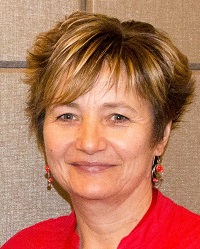
Joyce Van Donkersgoed, DVM, grew up on a mixed beef cattle and grain farm east of Coaldale, AB. She graduated from the Western College of Veterinary Medicine (WCVM) in 1985 and practiced as a beef cattle vet for two years before returning to WCVM to complete a clinical residency and Master of Veterinary Science degree in Advanced Bovine Medicine and Epidemiology. She then worked at the WCVM Department of Herd Medicine as an associated professor, doing clinical work and applied research in cow-calf ranches and feedlots. She returned to Alberta in 1995, working at the Animal Diseases Research Institute as a beef epidemiologist, then as a consultant to Alberta Agriculture, Food and Rural Development as the provincial beef veterinarian and then later for Canadian Cattlemen’s Association and Alberta Cattle Feeders Association (ACFA) on beef quality, food safety, animal health and environmental matters. In 2004, Joyce returned home and set up a feedlot consulting veterinary practice, providing herd health, research, emergency and regulatory services to large feedlots and a large lamb feedlot and ewe barns in the Picture Butte area.
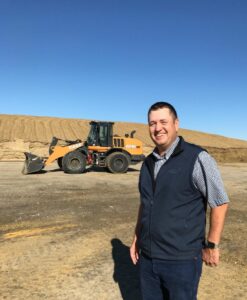
Jake Bueckert is the managing owner of Driland Feeders, a custom feedlot, near Warner, Alberta. Jake is also a director of the Alberta Cattle Feeders’ Association. Driland Feeders is a verified feedlot with the Verified Beef Production Plus (VBP+) program.
Mentee: Dr. Stephanie Terry
Mentors: Christine Rosser and Ryan Kasko
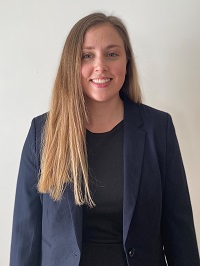
Dr. Stephanie Terry is a research scientist with Agriculture and Agri-Food Canada’s Lethbridge Research and Development Centre. Her research interests include investigation of nutritional and technological strategies to mitigate ruminant greenhouse gas production and enhance the efficiency of beef cattle production.
Christine Rosser grew up on a small cow-calf farm in southwest Saskatchewan, where her dream was to take over the family farm. She completed a Bachelor of Science in Agriculture from the University of Saskatchewan, during which she completed a research thesis with Dr. Greg Penner looking at optimal harvest maturity of small grain cereals harvested for swath grazing or green feed. This research led Rosser to a Master of Science in Animal Science from the University of Saskatchewan on the same topic.
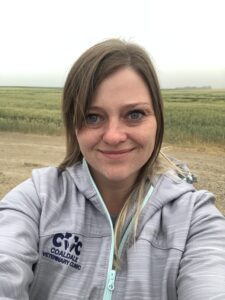
After being bit by the research bug, Christine moved to Alberta to work at the Lethbridge Research and Development Centre (LeRDC) to complete a PhD from the University of Alberta under the supervision of Drs. Alexander, Beauchemin and Oba. Christine has always been interested in the practical application of beef research, and during the last year of her PhD she also worked as a ruminant nutritionist out of the South West Animal Health Centre in Swift Current, SK. She worked at the LeRDC for two years on greenhouse gas mitigation strategies. She is now a ruminant nutritionist at the Coaldale Veterinary Clinic. She is now living out her childhood dreams in a slightly differently way, as she and her fiancé operate a small cow-calf herd on the side.
Ryan Kasko is the general manager of his family’s cattle feeding and farming business located near Lethbridge. He attended the University of Lethbridge and graduated with a Bachelor of Management. He has been active in many industry and community groups and has served as chair of the Alberta Cattle Feeders’ Association, chair of Economic Development Lethbridge and chair of the Canadian Beef Industry Conference. Ryan is married to Shannon, and they have four young adults who are busy with school, work and play.
Click here to subscribe to the BCRC Blog and receive email notifications when new content is posted.
The sharing or reprinting of BCRC Blog articles is welcome and encouraged. Please provide acknowledgement to the Beef Cattle Research Council, list the website address, www.BeefResearch.ca, and let us know you chose to share the article by emailing us at info@beefresearch.ca.
We welcome your questions, comments and suggestions. Contact us directly or generate public discussion by posting your thoughts below.
